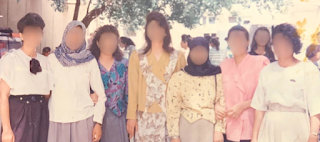
Now an Arabic instructor in the IDF, V. was one of the last Iraqi Jews to make aliya. She tells her incredible story of growing up under Saddam’s regime to Israel Hayom (With thanks: Lily)
A photo which V brought out of Iraq shows her with family members and friends
The family decided not to forgo their Jewish identity, but for their own safety, they chose to hide it as much as possible.
One of V.’s first childhood memories was drawing shapes on a piece of paper. One was a Star of David. Her family panicked and made her promise never to do it again. V.’s first encounter with the Hebrew language was also scary.
“I remember one time I was sitting at home with my dad and he was looking for something to listen to on the radio. Suddenly, we heard a broadcast in a language I couldn’t identify and sounded very strange to me. My dad looked at me in total silence and changed the station.”
“I noticed what station it was and he saw me looking. And he whispered, ‘Don’t you dare to look for it later. That’s Hebrew. It’s illegal. If they catch us, we’re done for.”
V. falls silent.
“You have to understand. We didn’t show anyone that we were Jews. We weren’t taught the language, the religion, or the customs. From age four I knew what I could say to those around me and what I couldn’t. I knew we were Jewish, but I didn’t really understand what that meant at that age. I only knew I wasn’t a regular kid.”
Leading a double life from such a young age came at a price, which was declaring loyalty to the regime. When she started elementary school, V. was recruited for the scouts, the youth movement of the Saddam regime. Unlike youth movements in Israel, the Iraqi scouts was actual military training. V. was given a uniform, a gun, and a hefty dose of Ba’ath party propaganda.
Israel was always the enemy. “I realized that I had to prove that I was more loyal to Iraq than anyone else. That I was the most Iraqi anyone could be,” V. says.
Her school studies only increased her exposure to the propaganda of the regime and put V. into a permanent dilemma. “The brainwashing was absolute. In school, in the media, the message was always the same. If there is a situation of war or danger, our loyalty was first and foremost to Saddam and the regime. I was confused between my identity at home and the one I adopted when I was with friends at school and in the youth movement.”
When V. reached high school, things only got more complicated. “I finished elementary school without any of my childhood friends knowing I was Jewish. When I got to junior high and high school I encountered difficulties being accepted because of the lessons in religion. It was the first time I talked with my mom about religion. I asked her to stop hiding so I could show myself for who I was. She scolded me and once again there was the threat and the stories about what my father had been put through.”
But this time, V. would not be deterred from revealing her true identity to her friends. She was sick of hiding. “In the end, I decided to tell my friends I was Jewish. I prepared myself for the worst, for anti-Semitism and even violence. There was no violence, but there were anti-Semitic questions… even the blood libel about Passover matzah was brought up. I needed to explain that I was a Jew, not a monster, but in the end it went fine and made me stronger.”
Although her high school friends accepted her, V. began to realize that she had no future in Iraq. The family was living in constant fear that the regime would discover that her brother was living in Israel and that her father would be taken in for interrogation again.
V. secretly started to dream of making aliyah to Israel, and some Jewish girlfriends helped her. “From a young age, I had two Jewish friends and we’d play a game that had real meaning,” she says. “We invented all sorts of written codes so in case one of us left Iraq, we could communicate freely in letters. Innocent lines like, ‘What’s the trendy color there now?’ or ‘When can you start studying in Holland?’ became codes for getting visas to leave Iraq and make aliyah. That funny game eventually helped us a lot at the moment of truth.” Surprisingly, the memory sparks a need for V. to explain that while the Iraq of her childhood was a tough and frightening place, it was not hell on earth.

Leave a Reply